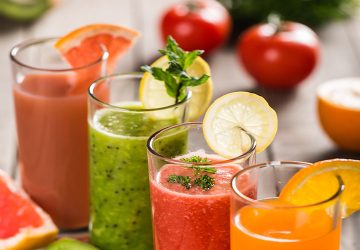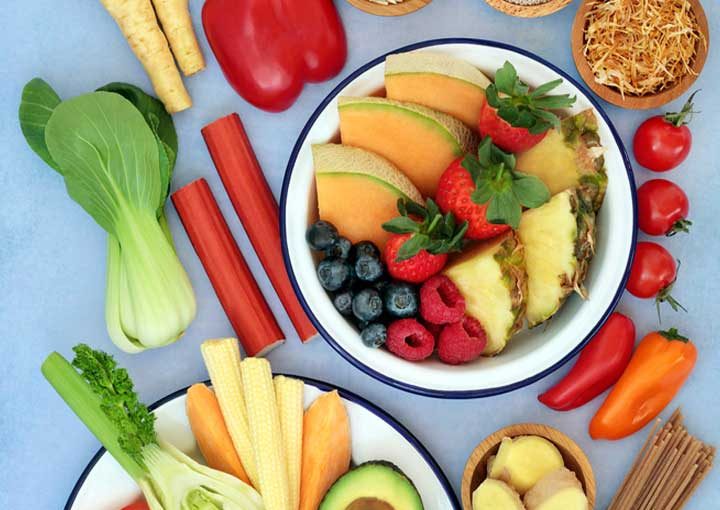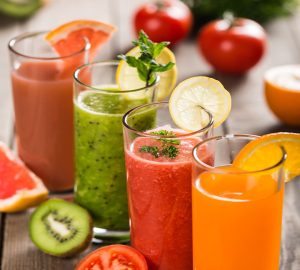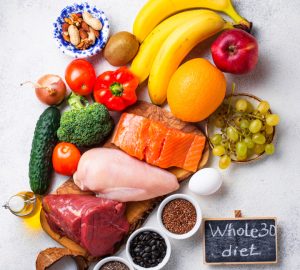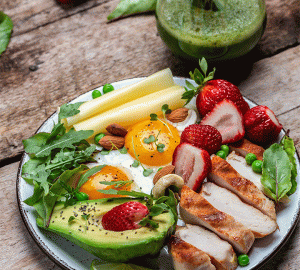[ad_1]
Going on the IBS diet may just be the solution to your digestive issues. It is designed to eliminate food items that trigger irritable bowel syndrome (IBS), a common gastrointestinal disorder that can be extremely uncomfortable and painful. Apart from medicines, managing this condition requires lifestyle changes and a mindful and balanced approach to eating. In this article, we discuss the fundamentals of this diet, food lists, and strategies for your own diet plan. So, scroll down to learn more about the IBS diet and how to alleviate the symptoms of your condition.
 At A Glance: IBS Diet
At A Glance: IBS Diet- Principle: Elimination of foods that may aggravate the digestive system
- Purpose: To alleviate the symptoms of Irritable Bowel Syndrome
- Who It Is For: Individuals dealing with IBS or general digestive issues
- Duration: Short-term
- Who Should Avoid: Pregnant and nursing women and people with nutrient deficiencies and other gastrointestinal conditions like celiac disease or irritable bowel disease
- Cons: May cause nutrient deficiencies, food sensitivities, and eating disorders
What Is The IBS Diet?
The IBS diet is a short-term elimination diet that helps manage IBS symptoms. It is not a singular diet plan. It instead consists of various diet strategies to reduce symptoms and gradually reintroduce eliminated foods to identify the specific triggers that provoke those symptoms. Based on the observations made during this diet, a dietitian may customize the diet plans to suit an individual’s specific IBS conditions and requirements for long-term management.
Irritable bowel syndrome is a functional intestinal disorder characterized by recurrent abdominal pain, flatulence, bloating, diarrhea, and constipation. It is a chronic condition without cure and requires long-term management.
According to the International Foundation for Gastrointestinal Disorders, 5% to 10% of the global population has IBS. Approximately, 20% to 40% of annual gastroenterologisti XA medical expert specializing in the diagnosis, treatment, and prevention of gastrointestinal diseases. visits are due to IBS. Further, there are 2.4 to 3.5 million annual physician visits for IBS in the US alone (1).
Currently, 25 to 45 million people in the US are affected by this condition. Men account for 35% to 40% of the cases while women account for 60% to 65% of the cases. This disorder also impacts 6% to 14% of the global adolescent population and shows consistent symptoms (1).
IBS symptoms require immediate medical intervention, and one of the first measures taken is dietary modification.
IBS can have a severe impact on your day-to-day life. A 2018 online survey conducted on people with self-reported IBS found that 68.8% reported at least one bowel syndrome in the last 12 months. Further, the prevalence of IBS symptoms such as bloating, diarrhea, and flatulence were higher in women than in men.
Prevalence Of Self-Reported IBS Symptoms In The Adult Belgian Population
Source: Prevalence and impact of self-reported irritable bowel symptoms in the general population (2018)
The next section will help you understand what foods you can include in your IBS diet.
Foods To Eat On The IBS Diet
While the food items may vary based on the IBS diet type, the following list includes foods that you may consume with IBS:
- Fruits: Bananas, raspberries, blueberries, strawberries, kiwis, grapes, and oranges
- Vegetables: Cucumbers, lettuce, carrots, zucchini, pumpkin, eggplant, and bell peppers
- Proteins: Chicken, eggs, turkey, fish, tofu, red meat (in moderation, only if you can tolerate it)
- Gluten-Free Grains: Rice (white or brown), quinoa, and gluten-free certified oats
- Nuts And Seeds (In Moderation): Almonds, walnuts, pine nuts, macadamia nuts, and pecans
- Herbs And Spices: Ginger, basil, thyme, oregano, black pepper, cilantro, sage, and paprika
- Lactose-Free Dairy And Alternatives: Lactose-free milk, hard cheese, yogurt, and dairy alternatives like almond or coconut milk/yogurt
- Sweeteners: Stevia, glucose, dextrose, and agave
- Beverages: Herbal teas, juices from the fruits mentioned above (low-quantity), and lactose-free drinks
Now that you know what foods you can eat on this diet, it is equally important to learn about the foods you should avoid to further aggravate the symptoms.
Foods To Avoid On The IBS Diet
The following foods may trigger IBS symptoms and are thus eliminated from the IBS diet:
- Fruits: Apples, pears, peaches, mangoes, cherries, watermelon, plums, and nectarines
- Vegetables: Cauliflower, mushroom, broccoli, Brussels sprouts, onions, garlic, artichoke, and asparagus (to be avoided in raw forms as well as they are difficult to digest)
- Processed Foods: All processed foods, including sausages, deli meats, hot dogs, etc., as they contain preservatives and additives
- Wheat Products: Pasta, cereals, and bread
- Legumes: Chickpeas, black beans, lentils, and kidney beans
- Dairy Products: Lactose-containing milk, yogurt, soft cheese, and cream
- High-Fat Foods: Deep-fried, greasy foods and fatty meat cuts (may worsen bloating) (2)
- Spicy Foods: Too much spice can irritate the digestive tract and trigger IBS symptoms(2)
- Drinks: Coffee, caffeinated drinks, sodas, carbonated drinks, and alcoholic beverages
- Sweeteners: High-fructose ingredients, sorbitol, xylitol, and mannitol
- High-Sugar Foods: Sugary desserts, snacks, and candies (may trigger IBS symptoms) (3)
It is important to note that overeating may also disturb digestive functions and exacerbate IBS symptoms. Eat smaller and frequent meals spread throughout the day for easier digestion.
The actual diet recommended to an individual with IBS also depends on the severity of the symptoms and their food sensitivities. We shall now explore a few popularly adopted IBS diets that may also be tailored to an individual’s needs.
Common Types Of IBS-Friendly Diets
Your personalized IBS diet includes two widely accepted diet plans and suggestions from your healthcare expert. Let us take a look at what they are and how they may help with IBS.
Low-FODMAP Diet For IBS
The low-FODMAP diet is one of the most widely recognized diets that may significantly improve IBS symptoms (4).
The acronym FODMAP stands for fermentable oligosaccharides, disaccharides, monosaccharides, and polyols. They are a group of hard-to-digest short-chain carbohydrates (sugars) that can ferment in the colon, pull excess water into the bowel, and trigger flatulencei XThe accumulation of gasses in the digestive system that results in belching and makes one pass wind through the anal passage. . This can result in abdominal pain, bloating, and diarrhea.
It is an elimination diet that temporarily excludes all high-FODMAP foods for 2 to 6 weeks to reduce IBS symptoms. These foods, then, are gradually reintroduced into the diet to determine which ones actually cause symptoms.
The following are the high-FODMAP foods to avoid on the IBS diet:
- Fruits: Pears, peaches, apples, mangoes, nectarines, plums, and watermelon
- Vegetables: Onions, broccoli, Brussels sprouts, asparagus, and artichoke
- Legumes: Lentils, kidney beans, and chickpeas
- Wheat products: Pasta, bread, and cereals
- Artificial Sweeteners: Sorbitol, xylitol, mannitol, maltitol, and isomalt
- Lactose: All lactose products (if you have lactose intolerance)
The following are low-FODMAP foods that you may eat on the IBS diet:
- Fruits: Strawberries, blueberries, grapes, and oranges
- Vegetables: Green beans, pumpkin, zucchini, eggplant, carrots
- Lean Proteins: Skinless chicken, turkey breasts, eggs, cod, and halibut
- Grains: Rice and quinoa
- Lactose-Free Products: Lactose-free milk or alternatives like coconut, almond, or rice milk (if you have lactose intolerancei XA condition where the body cannot digest dairy sugars (lactose) due to the lack of the digestive enzyme lactase. )
 Pro Tip
Pro TipBeware of FODMAP stacking. This is a condition where eating the same types of FODMAPs can clog the gut and worsen digestive symptoms. Avoid this by incorporating different types of food in your meals and ensuring a balanced diet.
The low-FODMAP diet is perhaps the most commonly known diet plan for IBS. However, gluten is another ingredient that must be avoided due to its close association with the condition. Scroll down to the next section to learn more about the gluten-free diet for IBS and how it works.
Gluten-Free Diet For IBS
Gluten, a protein found in wheat and certain grains, is a potential irritant and is associated with multiple gastrointestinal disorders including IBS, celiac diseasei XA genetic autoimmune disease where gluten consumption causes inflammation in the lining of the small intestine. , Crohn’s diseasei XA type of chronic inflammatory bowel disease characterized by the swelling of the digestive tract that causes diarrhea and abdominal pain. , ulcerative colitisi XA type of chronic inflammatory bowel disease that causes inflammation in the colon and rectum and increases the risk of colon cancer. , and so on (5). It is hard to digest and can also generate peptidesi XSmall amino acids that regulate various digestive functions such as food intake and gastric emptying. that negatively impact the digestive and the immune systems.
A 2016 UK study conducted on people with IBS found that the majority of the subjects showed a marked improvement in abdominal swelling, depression, and anxiety with a gluten-free diet within 6 weeks (6).
Therefore, eliminating gluten from your diet may play a significant role in managing IBS. The following are some gluten-containing foods to avoid:
- Wheat
- Barley
- Rye
- Pasta
- Cereal
- Bread
- Crackers
- Gluten-containing sauces
- Malt vinegar
- Beer
You can incorporate gluten-free versions of pasta, bread, crackers, etc., if you do not wish to give up on your favorite foods.
 Quick Tip
Quick TipStructure your IBS diet journey into three simple phases – the elimination phase, where you exclude irritants from the diet; the reintroduction phase, where you add tolerable foods back into the diet; the personalization phase, where you create a diet plan tailored to your needs.
We have seen how dropping FODMAPs and gluten from your diet can ease your IBS symptoms. A natural consequence of eliminating whole food groups from your regular diet is weight loss. In the next section, we discuss how one can manage their weight effectively while on the IBS diet. Take a look.
IBS Diet For Weight Loss: Healthy Dieting Tips
IBS diet strategies are not intended for weight loss, although one may naturally lose weight due to the dietary restrictions. That said, these strategies are not recommended for healthy individuals intending to lose weight. However, individuals with IBS who wish to lose weight may adhere to the following to lose weight:
- Get An Individualized Plan: Consult your doctor or a dietician to customize a diet plan as they consider your food sensitivities, IBS symptoms, lifestyle, and weight loss goals.
- Practice Portion Control: Watch how much you eat while ensuring your body gets enough nutrition and energy. Frequent small meals spread throughout the day may be ideal.
- Have Balanced Meals: Ensure your meals have a good balance of whole grains, lean proteins, healthy fats, and vegetables.
- Take High-Fiber Foods: Introduce high-fiber foods into your diet gradually to promote proper digestion and curb your appetite. However, do not over consume insoluble fibers as they might trigger IBS symptoms.
- Exercise Regularly: Consult a physician to discuss an appropriate exercise regimen that helps manage your weight and treat IBS.
- Hydrate Yourself: Drink plenty of water and other tolerable fluids throughout the day for easy digestion, improved blood circulation, and to restore your body’s hydration levels.
- Manage Stress: Engage in mindfulness activities like yoga, meditation, or breathing exercises to reduce stress as it may otherwise trigger IBS symptoms and impact your weight (7), (8).
The above-mentioned steps make it possible for people with IBS to manage their weight healthily.
As IBS dietary modifications are constantly monitored, lifestyle changes must be adjusted accordingly. If you have just started with your IBS diet, observe its impact for a few weeks before gauging what works for you. In the next section, we have included a 30-day diet plan you can follow. Take a look.
30-Day IBS Diet Plan
Long-term management of IBS requires keeping regular tabs on your diet. A closely monitored 30-Day IBS diet plan will give you a fair idea of what works for your body and what doesn’t.
| Days | Breakfast | Lunch | Dinner |
| Monday | ½ cup of rolled oats in almond milk with a handful of blueberries or 4-5 strawberries | 1 bowl of Greek salad with tomatoes, olives, chopped lettuce, and feta cheese
OR 1 Caesar salad wrap with 85 grams of baked chicken breast, ½ cup of lettuce, 1 tablespoon of parmesan, and 2 tablespoons of low-FODMAP Caesar dressing |
3-4 lamb chops with 1/4th cup of mashed peas and 1 roasted capsicum
OR 85-100 grams of pan-seared fish with ½ cup of spinach salad and 50 grams of basmati rice |
| Tuesday | 1 slice of sourdough bread, 1 medium-size avocado, and 1 fried egg
OR 1 slice of gluten-free bread with 2 tablespoons of peanut butter |
250 grams of fresh soup made of any low-FODMAP ingredients and 2-3 rice cakes topped with avocado slices | 85-100 grams of grilled chicken breast with 1 cup of steamed vegetables and ½ cup of quinoa
OR 2 egg omelets loaded with potato, spinach, red capsicum, and tomatoes, and served with red pesto |
| Wednesday | 1 cup of lactose-free yogurt with ½ cup of gluten-free granola or ½ cup of blueberries | 2 slices of gluten-free bread for sandwiches; fill them with 85 grams of smoked salmon and slices of ½ an apple or with a bowl of salad made of 1 cup of spinach and 3-4 cherry tomatoes, with 1 tablespoon of low-fat mayo, and 1 boiled egg | 1 cup of stir fried rice noodles with 85 grams of tofu cubes, ½ cup of broccoli, and ½ red capsicum, chopped or sliced
You may use a garlic-free sauce for added flavor |
| Thursday | 2 slices of French toast made with gluten-free bread and 1 glass of almond or coconut milk
OR 2 slices of toasted gluten-free bread with scrambled eggs made from 2 eggs and tomatoes |
113 grams of sliced roasted turkey served with 2 slices of gluten-free bread, 1 slice of tomato, 1-2 lettuce leaves, 8-10 baby carrots, and a dip of 1 tablespoon of wholegrain mustard
You may substitute turkey with chicken |
85-100 grams of grilled salmon with 1 cup of brown rice and ½ cup of steamed broccoli
OR You may substitute salmon with 85-100 grams of grilled chicken |
| Friday | 1 glass of fruit smoothie made with 1 cup of strawberries or kiwi, oat milk, 2 teaspoons of chia seeds, 1 tablespoon of sunflower seeds, and ¼ cup of low-FODMAP muesli (experiment with fruit combinations for variety) | 1 cup of chargrilled vegetables served with 1 tin of tuna in water or crab meat
OR 1 bowl of low-fat supermarket potato salad served with tinned salmon or sardines |
1 low-FODMAP burger with 84-100 grams of turkey breast, 1 sliced and roasted zucchini, and 1 sliced and baked potato for filling |
| Saturday | 1 breakfast wrap made with low-FODMAP tortilla (pick your choice of fruits and hard cheeses for the filling) | 85-100 grams of grilled white fish with 2 cups of steamed mixed vegetables and 1/4th cup of mashed potatoes | 1 Buddha bowl made with 170 grams of tofu cubes, ½ cup of boiled edamame, ¾ cup of cabbage, cucumber, 40 grams of halloumi cheese, 1 cup of cooked brown rice, 2 tablespoons of tahini, and 1 teaspoon of salt-reduced soy sauce |
| Sunday | 1 bowl of porridge made of 40 grams of quinoa or oats made with ¾ cup of almond or rice milk (choose a handful of low-FODMAP fruits and nuts for topping) | 100 grams of grilled chicken breast with 1 cup of cooked quinoa and 1 plate of kale salad made of ½ cup of kale, 3-4 cherry tomatoes, 1 red capsicum, and 1 tablespoon of low-FODMAP dressing | 1 bowl of chicken risotto made with 1 cup of cooked risotto rice, 100 grams of chicken breast, ½ cup of diced oyster mushroom, and low-FODMAP seasoning |
You may also enjoy mid-morning and evening snacks while on the IBS diet. Here are a few low-FODMAP snack options that will keep you full.
- 30-40 grams of walnuts
- ½ cup of lactose-free yogurt
- 2-3 rice cakes topped with diced or smashed avocados
- 40 grams of baked kale chips
- 30-40 grams of fruit and nut bars
- 1 bowl of mixed berries in lactose-free yogurt or cream
- 30-40 grams of 70% dark chocolate with ½ cup of berries
- 5-10 baby carrots with garlic-free hummus
Go through the foods list, research basic nutrition facts, and plan your diet with well-balanced meals. You may also start your day with a hot cup of herbal tea made of ginger, sage, chamomile, licorice, or peppermint. Also, drink plenty of water (at least 2 liters) throughout the day to ensure proper hydration.
Now that we have a basic understanding of the IBS diet, let us explore some lip-smacking recipes you can try at home.
Recipes For IBS Diet
Constantly looking into ingredients to ensure a low-FODMAP-compliant meal can be a hassle. That is where the following recipes help. These are quick, delicious, and easy on your tummy.
1. Shrimp And Quinoa Salad
Ingredients
- 450 grams of shrimp, peeled and deveined
- 1 cup of quinoa
- 1 cup of mixed greens
- 1 cup of cherry tomatoes
- ½ cucumber, sliced
- Lemon vinaigrette dressing (made of 2 tablespoons of olive oil, juice of 1 lemon, and salt and pepper to taste)
Preparation Time: 25-30 minutes
How To Prepare
- Prepare the quinoa as per the package instructions.
- Season the shrimp with salt and pepper.
- Saute the shrimp in a non-stick pan until it turns pink.
- Mix the quinoa, shrimp, mixed greens, cherry tomatoes, and cucumber in a bowl and add the lemon vinaigrette dressing.
- Serve with 2-3 toasted gluten-free breadsticks.
2. Grilled Chicken With Steamed Vegetables
Ingredients
- 85-100 grams of skinless chicken breasts
- 1 cup of low-FODMAP mixed vegetables
- 1 tablespoon of olive oil
- Salt and pepper to taste
- Herbs for seasoning (optional)
Preparation Time: 20-25 minutes
How To Prepare
- Coat the chicken with olive oil, salt and pepper, and other seasonings of choice.
- Grill for 10-15 minutes while turning the chicken in intervals to ensure all sides are cooked.
- Chop the vegetables into uniform pieces.
- Boil 1 inch of water in a pot and add the vegetables. Close the lid and steam for 4-5 minutes until they are tender.
- Strain the vegetables and toss them in olive oil, salt and pepper, and other seasonings of choice.
- Slice the grilled chicken and serve with the steamed vegetables on the side.
3. Low-FODMAP Vegetable Omelet
Ingredients
- 2 large eggs
- ½ cup of spinach leaves
- ½ slice of bell pepper
- ⅓ cup of chopped chives
- 1 tablespoon of olive oil
- Salt and pepper to taste
Preparation Time: 10-15 minutes
How To Prepare
- Whisk the eggs in the bowl and add salt and pepper.
- Heat olive oil in a pan and add spinach, bell pepper, and chives until they are wilted and bright.
- Spread them uniformly and pour the whisked eggs into the pan.
- Cook on medium heat till the eggs are set and opaque.
- Fold the omelet, sprinkle with seasoning of choice, and serve.
You can experiment with simple dishes like these for filling and nutritious meals. Ensure all ingredients are low-FODMAP and practice portion control.
The IBS diet is designed to alleviate the symptoms of irritable bowel syndrome. It eliminates food items and groups that irritate the gastrointestinal lining and aggravate digestive symptoms. While these diet strategies have a basic universal blueprint, they can be customized according to your individual food sensitivities and symptoms. Consult a professional nutritionist to understand the complexities of the diet, draft personalized meal plans, and discuss healthy lifestyle measures to improve your overall health while tackling IBS.
Frequently Asked Questions
Are probiotics helpful for IBS?
Yes, probiotics are safe for consumption for individuals with IBS as they may improve intestinal immunity and relieve symptoms like pain and bloating (9).
Is fiber recommended for IBS?
Yes. However, most physicians recommend gradually increasing fiber intake to bulk up the stool and make digestion easier (10).
Can I still get enough nutrients on an IBS diet?
Yes. It is possible to get adequate nutrition with the IBS diet. Consult your physician to understand your symptoms and come up with a diet plan that makes up for any nutrient deficit.
How many times should you eat on the IBS diet?
You can eat 5-6 small meals at regular intervals spread throughout the day for easier digestion.
Can I eat a normal diet with IBS?
Yes. It is possible to eat a normal diet with IBS. However, you must first adhere to an IBS diet to eliminate all potential triggers from your diet, identify specific food intolerances, and significantly reduce their consumption.
Is fasting good for IBS?
While anecdotal evidence suggests that IBS fasting therapy may improve gastrointestinal motilityi XThe contractions of the smooth muscles within the walls of the gastrointestinal tract that help move the food along the tract. and gut microbiotai XA wide variety of microorganisms such as bacteria, fungi, and viruses occupying a particular environment. , it may not work the same way for everyone. More research is warranted to back up the efficacy of fasting for IBS.
Key Takeaways
- The IBS diet is an elimination dieting strategy that aims at reducing the symptoms of irritable bowel syndrome.
- Consuming low-FODMAP and gluten-free foods can significantly improve IBS symptoms and provide digestive relief.
- People with IBS may lose weight in a healthy manner while on this diet by following portion-controlled balanced meals and exercising regularly.
Navigating your meals with IBS can be challenging. Check out this video where a professional nutritionist takes you through a simple low-FODMAP recipe that is delicious and easy on the stomach.
Sources
Articles on StyleCraze are backed by verified information from peer-reviewed and academic research papers, reputed organizations, research institutions, and medical associations to ensure accuracy and relevance. Read our editorial policy to learn more.
- IBS Facts And Statistics
https://aboutibs.org/what-is-ibs/facts-about-ibs/ - Diet In Irritable Bowel Syndrome: What To Recommend Not What To Forbid To Patients!
https://www.ncbi.nlm.nih.gov/pmc/articles/PMC5467063/ - A Dietary Intervention With Reduction Of Starch And Sucrose Leads To Reduced Gastrointestinal And Extra-Intestinal Symptoms In Ibs Patients
https://www.ncbi.nlm.nih.gov/pmc/articles/PMC6682926/ - Low-FODMAP Diet Improves Irritable Bowel Syndrome Symptoms: A Meta-Analysis
https://www.ncbi.nlm.nih.gov/pmc/articles/PMC5622700/ - The Role Of Gluten In Gastrointestinal Disorders: A Review
https://www.ncbi.nlm.nih.gov/pmc/articles/PMC10096482/ - Efficacy Of A Gluten-Free Diet In Subjects With Irritable Bowel Syndrome-Diarrhea Unaware Of Their Hla-Dq2/8 Genotype
https://www.sciencedirect.com/science/article/abs/pii/S1542356515017152 - Impact Of Psychological Stress On Irritable Bowel Syndrome
https://www.ncbi.nlm.nih.gov/pmc/articles/PMC4202343/ - Psychosocial Stress And Change In Weight Among Us Adults
https://www.ncbi.nlm.nih.gov/pmc/articles/PMC2727271/ - Probiotics In Irritable Bowel Syndrome: A Review Of Their Therapeutic Role
https://www.ncbi.nlm.nih.gov/pmc/articles/PMC9116469/ - Dietary Fiber In Irritable Bowel Syndrome (Review)
https://www.ncbi.nlm.nih.gov/pmc/articles/PMC5548066/
Related
[ad_2]



